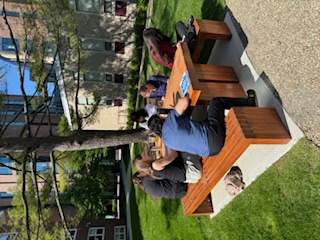Following the initial three-day session, participants engage with a partner faculty member monthly throughout the course of the program, which Dr. Seshan said creates as sense of accountability to continue reflecting and improving on the coursework. Those meetings act as an opportunity to continue the conversation, discuss what is working well and what still needs to be worked on, she said.
The hope is that by next year the entire Emmanuel College faculty will have participated in the program, according to Emmanuel’s Vice President of Diversity and Inclusion/Chief Diversity Officer Dr. Keith Lezama ’07.
“It’s exciting to see the growth of the Inclusive Pedagogy Program. The commitment from our faculty is inspiring and truly speaks to who we are as a community. More importantly, this work will impact what takes place in the classroom,” Dr. Lezama said.
The content of the program features reflection and self-care for faculty members, ensuring that they are at their best to best support Emmanuel students. The content is also heavily data-driven, thanks to the diligence of Emmanuel’s Director of Institutional Research Alison Vallereux, and the whole research department, Dr. Lezama said: “The attention to data allows us to be intentional about our work.”
Faculty development directly impacts Emmanuel students and the quality of their instruction – and Dr. Seshan said it’s important that students see that growth.
“I think the students appreciate that we are constantly growing and we see ourselves as learners too – it’s the connection between students and faculty that makes the students succeed and want to stay.”
That ripple effect can make an impact, especially within Emmanuel’s small classes, said Professor of Sociology Dr. Catherine Bueker, positively impacting retention and graduation rates.
Having taught at Emmanuel for 18 years, Dr. Bueker said participating in the IPP helped her to adjust her approach to syllabi – in addition to presenting the academic piece, also adding a social and emotional component of a welcoming statement and more inclusive language.
“Even if it makes a difference to two or three students in a classroom, that’s big,” she said.
Chair of the Emmanuel College Psychology Department Dr. Linda Lin, participated in IPP last year where faculty worked on adjusting their classroom setting from a “deficit-focused” approach to a “strengths-based” approach.



